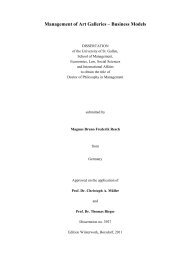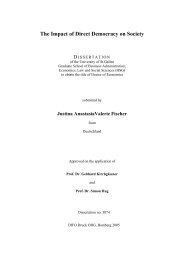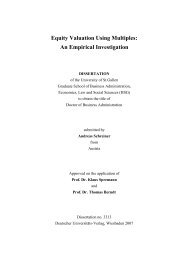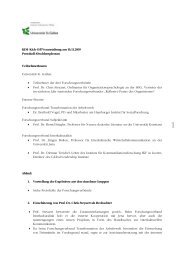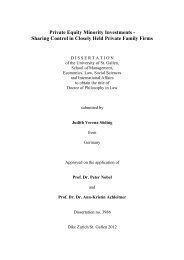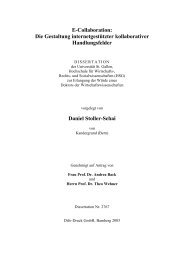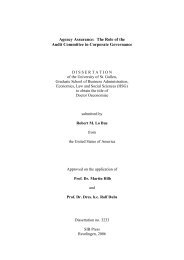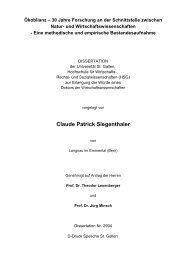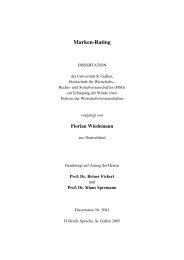Bedarfsanalyse fachlicher Metadaten - Universität St.Gallen
Bedarfsanalyse fachlicher Metadaten - Universität St.Gallen
Bedarfsanalyse fachlicher Metadaten - Universität St.Gallen
Sie wollen auch ein ePaper? Erhöhen Sie die Reichweite Ihrer Titel.
YUMPU macht aus Druck-PDFs automatisch weboptimierte ePaper, die Google liebt.
88 Beitrag C.2<br />
Data security management comprises activities to develop and execute security policies<br />
in order to meet internal and regulatory requirements [DAMA 2009; Whitman,<br />
Mattord 2007]. Thereby audit metadata increases the transparency on compliance and<br />
ensures the traceability of compliance issues through audit logs [Shankaranarayanan,<br />
Even 2004; Shankaranarayanan, Even 2006]. Overall, transparency and traceability on<br />
compliance reduces regulatory fines by proactively managing privacy protection and<br />
confidentiality.<br />
10.3.2 Extraction of Information from BI-Systems<br />
Within systems theory information is defined as data within a certain context, whereas<br />
data itself has no meaning beyond pure existence [Ackoff 1989]. BM describes the<br />
context of data by providing additional information (e.g., definitions and applied transformation<br />
rules). Therefore, the benefits of BM in the context of information extraction<br />
are closely related to the usage dimensions of data quality: ease of understanding,<br />
interpretability, believability, and accessibility [Wand, Wang 1996; Wang, <strong>St</strong>rong<br />
1996].<br />
Ease of understanding evaluates to which extend information is clear, readable, and<br />
easily understood. Hereby, definitional metadata can be used to enforce a unique terminology<br />
and communication language within the enterprise by eliminating terminological<br />
defects [Hüner, Otto 2009; <strong>St</strong>ock, Gubler 2009; Vaduva, Vetterli 2001]. Ease<br />
of understanding, therefore, increases the acceptance and usage of BI-Systems [Foshay<br />
2005; Foshay, Mukherjee, Taylor 2007] and/or results in less need for first-level support.<br />
From an information producer perspective, a unique terminology also increases<br />
the data quality by fostering a consistent data entry.<br />
Interpretability evaluates to which extend information is interpretable in the light of<br />
individual belief, judgment, and circumstances. Especially definitional and quality metadata<br />
is necessary to assess the information’s fit for use [Chengalur-Smith, Ballou,<br />
Pazer 1999; Fisher, Chengalur-Smith, Ballou 2003]. In addition, annotations are a<br />
means of pointing out recent events through structured comments. From an information<br />
producer perspective, annotations also increase the flexibility during information<br />
entry. Better interpretability results in better decision making [Chengalur-Smith, Ballou,<br />
Pazer 1999; Fisher, Chengalur-Smith, Ballou 2003].<br />
Believability evaluates to which degree the information is trustworthy. Since BI-<br />
Systems are often regarded as black boxes, process and quality metadata helps to increase<br />
transparency on the information value chain [Even, Shankaranarayanan, Watts



